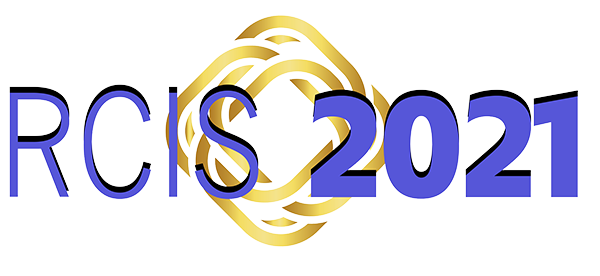February 19 , 2021
March 19, 2021
12 Mar 2021 – 11 May 2021
Anna Perini
FBK, Italy
Email: perini@fbk.eu
Registration - Accommodation
EASY CONFERENCES
Website: www.easyconferences.eu
Email:info@easyconferences.eu
15th International Conference on
Research Challenges in Information Science (RCIS2021)
11 - 14 May 2021, Limassol, Cyprus
Tutorial submission deadline: March 19, 2021
RCIS has become a well-recognised conference on research challenges in information sciences. Organised for the fifteenth time in a row, RCIS 2021 will be held from May 20-22, 2020, in Limassol, Cyprus.
Tutorials are intended to provide independent instruction (know-how) on a topic of relevance for the RCIS academic and practitioner community. However, we discourage commercial or sales-oriented tutorials. Potential presenters should keep in mind that there might be a varied audience, including novice graduate students, seasoned practitioners, and specialised researchers. Tutorial speakers should be prepared to cope with this diversity.
The conference has specific slots for tutorials. They will be organised in sessions of 90 minutes with a free format. Tutorials run in parallel with other conference tracks, and participation in the tutorials is included in the attendees’ conference fee. We invite proposals for tutorials that may address one or more of the listed topics below, although authors should not feel limited by them.
A 2-page summary of the tutorials that end up being accepted and delivered will be published in the conference proceedings, which will be published by Springer in the Lecture Notes in Business Information Processing series.
The special theme of RCIS 2021 is Information Science and global crisis. Global crisis, as the pandemic we are experiencing in these days, natural disasters, wars and international political crisis, are challenging Information Science to help building effective management solutions, to learn from previous experience how to prevent them, and to support Humans keep on performing core activities, as education, and communication. The diversity of crises’ causes, the quality of the collected data as well as the complexity of the underlying mechanisms are among the relevant research challenges.
Beyond the special theme for RCIS 2021, the conference welcomes tutorial submissions from any domain of Information Science. The list of topics includes, but is not limited to:
|
Information Systems and their Engineering
|
User-Oriented Approaches
|
|
Data and Information Management
|
Business Process Managements
|
|
Domain-specific IS Engineering
|
Data Science
|
|
Information Infrastructures
|
Reflective Research and Practice
|
Tutorial proposals are limited to 5 pages. They must include each and every of the following elements:
- A title;
- A 150-word abstract;
- The expected background of the attendees;
- Learning objectives of the tutorial;
- Structure of contents or activities; that is, a description of how they support the learning objectives, and how they will be presented to the attendees including a timetable that clearly indicates how the interaction with the audience will develop during the tutorial (tutorials should last minutes).
- Support materials. A concise description of material(s) that are needed for your tutorial; more specifically, (i) materials relevant to the tutorial that you would like to share prior to the conference, (ii) special requirements or equipment you plan to request for the delivery of the tutorial (subject to approval of the organisers), (iii) materials that will be provided to attendees during the tutorial;
- A contingency plan to deliver the tutorial online if the COVID-19 pandemic forces such situation. In principle, the tutorial is to be delivered in person, in the conference venue; however, it may be that it has to be delivered online, so please explain the extent to which this would be possible and what would be the effect of this change. Please pay special attention to the interaction with attendees in such online setting.
- Added value of the tutorial for the attendees;
- A short bio of the presenter(s);
- A history of the tutorial; that is, whether this tutorial (or any derived version of it) has already been delivered in other conferences. If so, detail where and when, and how it was received. Proven track record has to be balanced with the innovative aspect of the tutorial.
In preparing your proposal, you are encouraged to include some creative techniques for teaching and learning. Any teaching approach that ensures active interaction would be greatly appreciated by the RCIS audience. We encourage you to craft a tutorial that can deliver high quality content in an enjoyable way.
Please also consider including printed or online take away material for attendees. For example, templates, checklists, frameworks, etc. that attendees can employ in their own working environments.
We finally encourage authors to optionally include a 1- or 2-minutes video of the speakers, or a few example slides, teasing their tutorial. This increases the chances to that your tutorial will be selected.
By submitting a tutorial proposal, authors implicitly agree that they will indeed attend the conference to deliver the tutorial.
Proposals must be submitted using the conference submission site (https://www.easychair.org/conferences/?conf=rcis2021), where you choose the track “RCIS2021_Tutorials”.
The authors of accepted tutorials will be asked to submit a 2-page summary of the tutorial using the Springer LNCS/LNBIP conference proceedings template (https://www.springer.com/gp/computer-science/lncs/conference-proceedings-guidelines).
A free registration for the conference will be offered to the main presenter (i.e. to one speaker), unless they are the only paying author of a paper presented at the conference.
- Tutorial submission deadline (strict): March 19, 2021 (AoE)
- Tutorial notification: March 22, 2021
- Camera-ready version of tutorial summary for conference proceedings:
March 29, 2021- March 26, 2021 - RCIS 2021 conference: May 11-14, 2021
Sergio España |
Patricia Martín-Rodilla |



